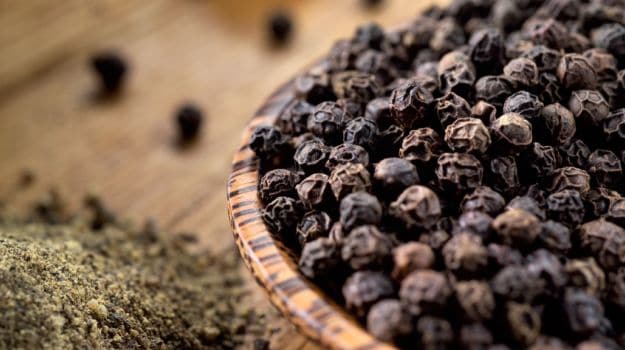Black pepper, (Piper nigrum), also known as pepper, is a perennial climbing plant of the family Piperaceae. It has a fervently sharp flavor produced by its fruits. Black pepper is local to the Malabar Coast of India and is perhaps the oldest spice known. Mainly utilized to flavor food around the globe, pepper likewise has restricted use in medicine.
In early historical times, pepper was grown in tropical Southeast Asia, where it turned out to be profoundly used as a condiment. Pepper turned into a significant article of overland exchange among India and Europe and regularly filled in as a model of trade; accolades were required in pepper in old Greece and Rome. In the middle ages, the Venetians and the Genoese turned into the fundamental merchants of pepper in Europe.
Black Pepper is a significant nutritious food attributable to its cancer prevention agent, antimicrobial potential, and gastro-defensive modules.
Recent cell-culture studies anticipated the part of black pepper against several ailments. Black pepper, with pipeline as an active ingredient, may be useful in chemoprevention and controlling further development of tumors. The pipeline also aids cognitive functions, helps in supplement, retention, and improves gastrointestinal functions.
Since pepper can be put away for a long time without losing its flavor and fragrance, it has for some time been known as the master spice. Pepper has assumed a vital part from the beginning of time and has been a valued spice since ancient times. Since ancient Greece, pepper has held such high eminence that it was utilized as a flavoring as well as a currency and a sacred offering. Pepper was utilized to both honor the deities and to pay taxes and ransoms. Throughout the fall of old Rome, the attacking brutes were even respected by being given dark pepper. Also, in the middle ages, the abundance of a man was intermittently estimated by his reserve of pepper.
There are more than 2000 kinds of pepper, and the most widely recognized are:
Black pepper – is obtained by picking green grains, and afterward with no preparing dried in the sun. Black pepper is most usually utilized in the kitchen.
White pepper – acquired by exacting red, almost ripe berries, that are then dampened to have the option to eliminate the outside layer, and then dried. White pepper has a somewhat milder flavor than dark and is viewed as healthier.
Red pepper – is acquired from completely ripe, red beans, which are dunked in saltwater, at that point frozen or immediately dried. Its smell is frequently portrayed as a combination of pepper and lemon.
Green pepper – is acquired by picking the grain before maturing. The grain cycle is equivalent to that of red pepper.
Black Pepper was principally used to improve the flavor of food, however, through history; it likewise had an alternative purpose. The fascinating reality is, without a toothbrush and toothpaste, individuals utilized certain spices to eliminate or if nothing else decreased awful breath. Pepper was generally excellent for this reason because, aside from the solid flavor, it was accepted that it had some antiseptic properties. It was accepted that pepper assists with toothache, blockage, constipation, sleep deprivation, burn from the sun, and numerous different sicknesses.
Moreover, pepper diminishes the development of gases, invigorates urination and perspiration to eliminate toxins from the body.
Pepper is utilized to mitigate respiratory issues and has antibacterial properties, yet additionally has the potential cancer prevention agents.
It is valuable in shedding pounds since the external layer of peppercorn decidedly influences the breakdown of fat cells in the body.
The reason why pepper is so loved is that it fills significant culinary needs. Not only could its sharpness zest up bland foods, but also it could mask a food’s absence of freshness, the last being a particularly significant quality in the period before proficient methods for preservation.
Prof. ASHOK PANCHAL
Faculty of Hotel and Tourism Management
SGT University




